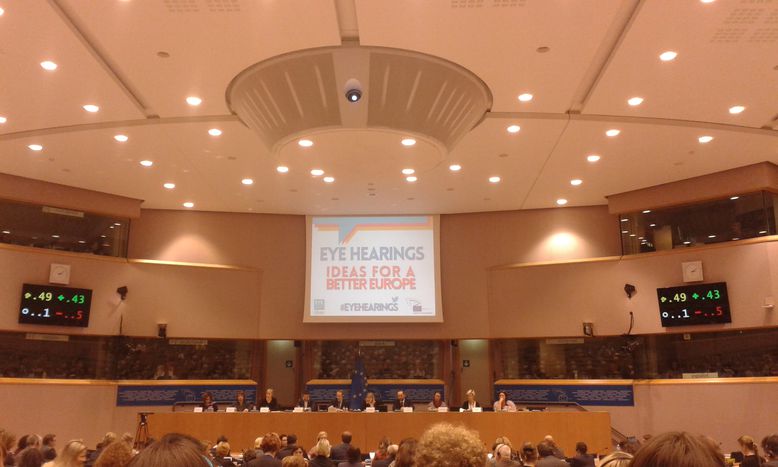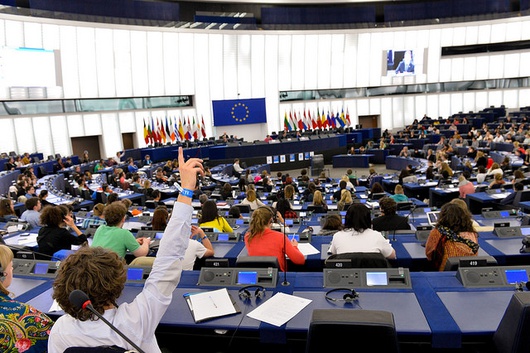
EYE hearings 2014: Ideas for a Better Europe
Published on
EYE hearings: an occasion to present young people's ideas on society issues to the European Parliament.
On December 2, four young people who attended the European Youth Event last May presented some key ideas. These were developed during the event, and proposed to members of the Employment and Social Affairs Committee of the European Parliament in a speed-hearings session.
European Youth Event: a forum to share ideas
The EYE was held in Strasbourg on 9-11 May 2014 and served as a forum for young people (aged 16-30) to develop ideas and opinions on several issues such as youth unemployment, the digital revolution, the future of the EU, sustainability and European values. The event was attended by 6.000 young people who came from all over Europe to make their voices heard by the EU institutions. In fact, the aim of the event was to demonstrate the will of young people to engage in developing a brighter future for the EU.
 The hearing was focused on the issue of youth unemployment, which affected all the societies of the EU. According to Eurostat, in September 2014, around 5.0 million young persons under 25 were unemployed in the EU28. The number decreased from February 2014, when the number of unemployed people reached 5.4 million [1]. However, the EU has not yet recovered from the crisis and young people are still experiencing low quality and low paid jobs; sometimes even poverty.
The hearing was focused on the issue of youth unemployment, which affected all the societies of the EU. According to Eurostat, in September 2014, around 5.0 million young persons under 25 were unemployed in the EU28. The number decreased from February 2014, when the number of unemployed people reached 5.4 million [1]. However, the EU has not yet recovered from the crisis and young people are still experiencing low quality and low paid jobs; sometimes even poverty.
Proposals made by the participants
One of the main causes for such problem, as presented by one of the four EYE representatives, is that national education does not provide the necessary skills to enter the labour market and this leads to a skills gap between the demand and the offer. For instance, young graduates do not know how to become entrepreneurs, as well as to access both credits and loans; hence they give up to such career’s perspective because they do not own the skills and the knowledge needed for such job.
Overcoming this issue would be possible with the introduction of coursework aimed at providing students the knowledge and the information necessary to do certain jobs, depending on the faculty they attend. Furthermore, traineeships, as a part of the study programme, could provide additional expertise to students. In this regard, traineeships should be used as ways to make young people gain professional experiences; in other words, they should be opportunities to learn and to prepare for a real job. However, most of the time they are used as a way to exploit young labour. Young people have the right to quality and stable employment that would allow them to live a respectable life.
There should also be a standard EU legislation to safeguard the internship’s conditions, as well as a Central European database for internship aimed at providing information on different opportunities and internships’ qualities. Last but not least, during the hearings, EYE representatives underlined the need to implement a European minimum wage.
 Another hot point of the hearings concerned the importance of the international mobility, which should include every person no matter their gender, their backgrounds and the society they come from. In other words, equal opportunities should be guaranteed within the EU, even to those people such as Roma population, who are often excluded by those initiatives.
Another hot point of the hearings concerned the importance of the international mobility, which should include every person no matter their gender, their backgrounds and the society they come from. In other words, equal opportunities should be guaranteed within the EU, even to those people such as Roma population, who are often excluded by those initiatives.
It would not be correct to say that the EU has not done anything to take care of those issues, as a matter of fact it created the “Youth Guarantee”, an instrument aimed at tackling youth unemployment by offering the opportunity to work or train within four months after losing a job or finishing school or university. However, this programme, whose budget is 6 billion euros, is not considered enough by EYE participants, who believe there has to be a more intensive investment in order to provide a substantial impact on youth unemployment. On the other hand, the four representatives presented the need of creation of a “New Marshall Plan”, a rescue programme to save Europe from such crisis, where 2% of GDP should be invested in the next ten years to recover it.
An opportunity to be heard
The members of the Employment and Social Affairs Committee recognised the importance of such problems, and took into account the requests and advices presented by young representatives. MEP Terry Reintke, for instance, underlined the importance to focus on short/medium term plans rather than long term ones, because the problem has to be tackled now.
This has been a great opportunity for young people to be heard and represented at the European Parliament. In January 2015, further ideas, grouped according to the competence of the Parliament’s Committees, will be presented in six further committees: Constitutional Affairs (AFCO), Foreign Affairs (AFET), Culture and Education (CULT), Environment, Public Health and Food Safety (ENVI), Civil Liberties, Justice and Home Affairs (LIBE) and Industry, Research and Energy (ITRE).
[1] See Eurostat's news release from 01/04/2014 and 31/10/2014



